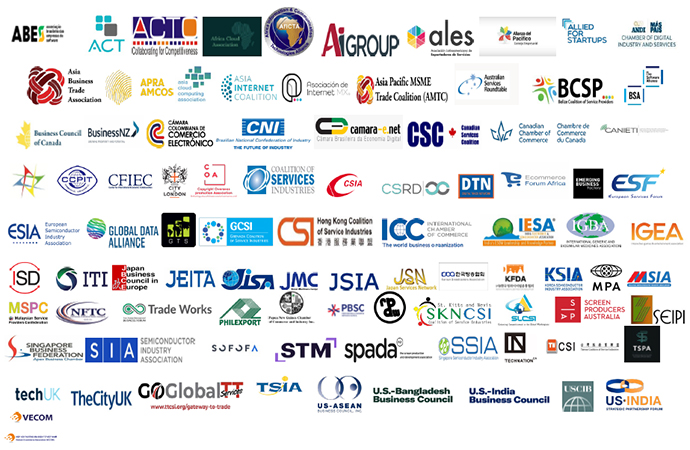
Global Industry Statement on
the WTO Moratorium on Customs Duties on Electronic Transmissions
On the occasion of the 12th WTO Ministerial Conference (MC12), the undersigned associations urge WTO members to renew the Moratorium on Customs Duties on Electronic Transmissions until the next Ministerial conference.
Allowing the Moratorium to expire would be a historic setback for the WTO, representing an unprecedented termination of a multilateral agreement in place nearly since the WTO's inception — an agreement that has allowed the digital economy to take root and grow. All WTO members have a stake in the organization's continued institutional credibility and resilience, as well as its relevance at a time of unprecedented digital transformation.
Continuation of the Moratorium is critical to the COVID-19 recovery. As detailed by the United Nations, the World Bank, the OECD, and many other organizations, the cross-border exchange of knowledge, technical know-how, and scientific and commercial information across transnational IT networks, as well as access to digital tools and global market opportunities have helped sustain economies, expand education, and raise global living standards.
Continuation of the Moratorium is also important to supply chain resilience for manufacturing and services industries in the COVID-19 era. Manufacturers — both large and small, and across a range of industrial sectors — rely on the constant flow of research, design, and process data and software to enable their production flows and supply chains for critical products.
The Moratorium is particularly beneficial to Micro, Small and Medium-Sized Enterprises (MSMEs), whose ability to access and leverage digital tools has allowed them to stay in business amidst physical restrictions and lockdowns.
Failure to renew the Moratorium will jeopardize these benefits, as customs restrictions that interrupt cross-border access to knowledge and digital tools will harm MSMEs, the global supply chain, and COVID-19 recovery — increasing digital fragmentation. As UNCTAD has explained, such fragmentation "reduces market opportunities for domestic MSMEs to reach worldwide markets, [and] ... reduces opportunities for digital innovation, including various missed opportunities for inclusive development that can be facilitated by engaging in data-sharing through strong international cooperation. ... [M]ost small, developing economies will lose opportunities for raising their digital competitiveness."#1
Furthermore, as the OECD has explained, "the revenue implications of the Moratorium are likely to be relatively small and its discontinuation would cause wider economic losses."#2 Other reports predict greater GDP losses due to potential implementation of retaliatory duties.#3 Countries that impose such duties also face longer-term harms due to a less predictable investment climate, reduced foreign direct investment, and reduced access to knowledge, information, and digital tools needed by local students, patients, MSMEs, and other domestic constituents.
Finally, at a time when G20 leaders, seeking to establish "a more stable and fairer international tax system," have formally endorsed the OECD Inclusive Framework's Two-Pillar Solution to Address the Tax Challenges Arising from the Digitalisation of the Economy,#4 it seems unnecessarily disruptive for the WTO membership to abandon a foundational quarter-century old agreement regarding the treatment of electronic transmissions.#5 We also note in this regard the recent G7 Digital Trade Principles, which state that "[e]lectronic transmissions — including the transmitted content — should be free of customs duties, in accordance with the WTO Moratorium on Customs Duties on Electronic Transmissions."#6
We therefore urge all WTO members to show strong leadership and support of the digital economy by supporting a continuation of the WTO Moratorium on Customs Duties on Electronic Transmissions at MC12.
Sincerely,
|
|
- UNCTAD, Digital Economy Report (2021), at:
https://unctad.org/system/files/official-document/der2021_en.pdf - OECD, Electronic Transmissions and International Trade — Shedding New Light on the Moratorium Debate, TAD/TC/WP(2019)19/FINAL (2019), at:
https://one.oecd.org/document/TAD/TC/WP(2019)19/FINAL/en/pdf - ECIPE, The Economic Losses from Ending the WTO Moratorium on Electronic Transmissions (2019), at: https://ecipe.org/publications/moratorium/
- OECD, Statement on a Two-Pillar Solution to Address the Tax Challenges Arising from the Digitalisation of the Economy, OECD/G20 Base Erosion and Profit Shifting Project (Oct. 8, 2021), at: https://www.oecd.org/tax/beps/statement-on-a-two-pillar-solution-to-address-the-tax-challenges-arising-from-the-digitalisation-of-the-economy-october-2021.pdf
This statement was agreed to 136 countries participating in the OECD/G20 Inclusive Framework. For a full list of participating countries, see https://www.oecd.org/tax/beps/oecd-g20-inclusive-framework-members-joining-statement-on-two-pillar-solution-to-address-tax-challenges-arising-from-digitalisation-october-2021.pdf - G20, G20 Rome Leaders' Declaration (Oct. 31, 2021), para. 32, at:
https://www.g20.org/wp-content/uploads/2021/10/G20-ROME-LEADERS-DECLARATION.pdf - G7, G7 Trade Ministers' Digital Trade Principles (Oct. 22, 2021), at:
https://www.gov.uk/government/news/g7-trade-ministers-digital-trade-principles.
The statement provides in relevant part as follows: "Electronic transmissions — including the transmitted content — should be free of customs duties, in accordance with the WTO Moratorium on Customs Duties on Electronic Transmissions. We support a permanent prohibition of such duties."

